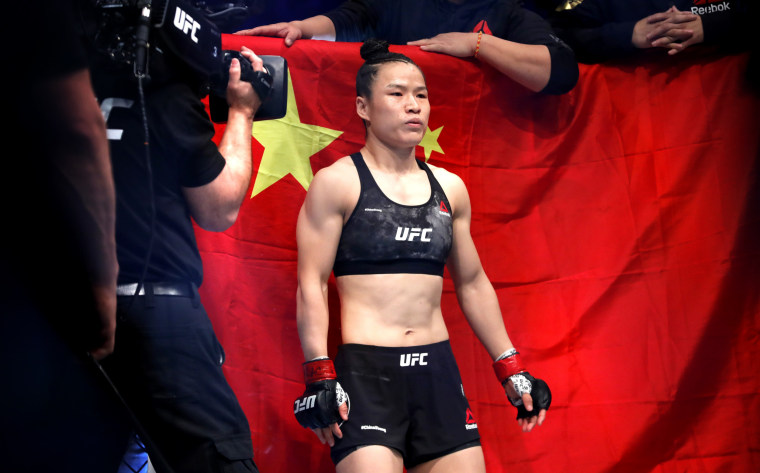China’s first UFC champion has been using her platform to attempt to unite people during the coronavirus pandemic.
Zhang Weili, who successfully defended her title at the UFC 248 main event against Poland’s Joanna Jedrzejczyk in Las Vegas earlier this month, wants to dedicate her fight to those around the world and “encourage them, to motivate them to win the combat against coronavirus,” she told NBC News through a translator.
“I’ve been through this outbreak when I was in China, and I love China. I’ve traveled to a few countries that have weakened in the outbreak so I’ve experienced that … The world is very small and I’m calling it ‘the village.’ So we live in the same village and need to try to come together to win the coronavirus combat.”
Zhang’s words are particularly significant as her opponent previously drew backlash for posting a racist coronavirus meme weeks ahead of their match. Jedrzejczyk, who left the fight with an extremely swollen forehead, had shared a since-deleted, photoshopped version of the pair’s fight poster that featured herself wearing a gas mask around Zhang. The outbreak is said to have originated in Wuhan, China. While most of the cases have occurred on the mainland, the number of new cases in China are tapering off.
After her win, Zhang, who had previously addressed Jedrzejczyk’s comments in her own Instagram post, refrained from making the typical victory speech, nor did she further chastise her opponent for the comments. Instead, she used her interview in the octagon to stress unity while people confront the illness. Putting her words into action, the winner, along with her opponent, shared a poignant chat at the hospital where both were admitted, she says. She now considers Jedrzejczyk a friend.
“I met her in the hospital right after the fight, and we were lying next to each other, and Joanna motivated me to keep fighting, keep defending,” she said through the translator. “I was really moved. I also told her we can train together someday.”
While Zhang hails from China, her win was also significant to many Asian Americans, specifically women, who’ve long confronted stereotypes of meekness and subservience. In a study on Asian American women and discrimination, published in the Asian American Journal of Psychology, only 4 of the more than 100 Asian American female participants said they had never experienced discrimination. Instead, the vast majority of study subjects experienced being stereotyped as “exotic,” “submissive,” “not a leader,” and “cute and small” among other themes.
Zhang says she doesn’t face much of the same racism herself in her own country, nor is she plagued by the stereotypes within her own industry as she says there’s a “mutual respect between us because we're the artists.” But she says she feels for Asian Americans who do and hopes that through her work she can expand the idea of what an Asian woman looks like.
“I also wanted to use the victory to show that Asian women are not weak and not submissive and we shouldn’t be defined by one single perspective,” she said. “We can be really strong and we can be powerful.”
